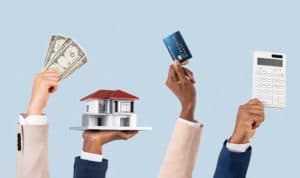When a mortgage borrower is unable to pay off their loan, a lender will opt to foreclose. This means they seize the property and sell it to recover their lost money. To avoid foreclosure, lenders and borrowers will forge a forbearance plan.
Added October 19, 2021: The Bureau of Consumer Financial Protection proposed amendments that establish a temporary COVID-19 emergency pre-foreclosure review period until December 31, 2021, for principal residences. This does not extend to secondary residences, vacation properties, or rentals.
The final rule establishes temporary procedural safeguards to ensure borrowers have an opportunity to be reviewed for loss mitigation before their forbearance period ends and before the mortgage lender can make the first notice or filing required for foreclosure. Moreover, the proposed amendments temporarily permit lenders to offer loan modifications to borrowers experiencing a COVID-19-related hardship post evaluation.
The CFPB’s final rule took effect August 31, 2021. These rulings apply to federally-backed loans. All other loan types are at risk of foreclosure without review. Check with your lender for options and proceedings. Sources include the CFPB and Federal Register (National Archives).
What is Forbearance?
Forbearance means the parties agree to new mortgage terms. The borrower will pay interest-only payments or smaller payments for a few months or a temporary pause on paying back the loan. These postponed payments will eventually be due. This debt is not forgiven.
Forbearance is good for anyone who has suffered a hardship. If a home is damaged in a flood, or the economy takes a hit, and you lose your job, forbearance eases mortgage stress. It is a complicated agreement because there is no “one size fits all” arrangement. Options will vary based on the lender, type of loan, and owner requirements in the mortgage loan.
Forbearance under the CARES Act
Protections under the CARES Act apply to all federally backed and federally sponsored mortgages (Updated: April 2021 to reflect new information).
- For mortgages backed by the FHA, USDA or, VA, the deadline to request an initial forbearance is June 30, 2021.
- For loans backed by Fannie Mae, Freddie Mac, FHA, USDA, or VA, your lender or loan servicer cannot foreclose on you until after June 30, 2021.
- If your financial hardship is due to the COVID-19 pandemic, you have a right to request and obtain a forbearance for up to 180 days (for a total of up to 360 days).
- When the forbearance period ends, you are not required to repay the skipped payments in a lump sum. You can discuss a repayment plan.
Can I sell my house while in forbearance?
The answer is yes; you can sell your house while in forbearance. However, the forborne amount must be paid back upon sale of the home. This amount will likely come out of the purchase price of the home. You must also pay off the owed balance remaining on the mortgage; this too comes out of your profit.
If you plan to sell while in forbearance, your lender might extend the forbearance agreement. Foreclosures are hugely expensive and can drag out for months. Lenders want their money back fast, and dealing in home sales can exhaust their time and resources. If you sell, a lender can receive full payment of the loan and be spared the home sale process.
Things to Consider
A forbearance is, again, a temporary loan modification. Note the word “temporary.” Even if you get the lender to give you an extension, you have to consider the selling process.
You enter forbearance because you cannot afford to make regular monthly mortgage payments. Now consider:
- If a home needs repairs or renovations, can you afford these?
- Can you afford professional cleaning and staging services to maintain walkthroughs?
- If you hire a realtor, they get a commission fee from the purchase price of the home. Selling a home costs money, and if you already have trouble making mortgage payments, can you really afford to sell through a traditional listing?
- In sum, can you afford to sell to another hopeful homeowner?
Instead, Sell to an Investor
If you want to sell fast and make a profit, consider selling your house to an investor. Most investors will make a cash offer on a home regardless of its condition or while it is in forbearance. You can enjoy a quick closing, pay off your loan and delayed payments, and be free of the menacing debt.






